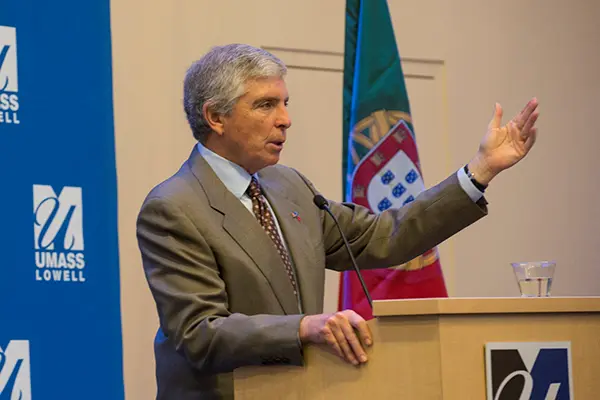Portuguese Center Wins Grants, Including $50,000 for Library

03/02/2016
By Katharine Webster
U.S. Ambassador to Portugal Robert Sherman told students that the United States sometimes has to work with hostile countries on issues of mutual interest, such as partnering with Russia on combating ISIS and trying to wind down the war in Syria, even while opposing Russian military incursions in Ukraine.
“Our alliances are entangling. We can no longer just deal with our friends,” Sherman said in a speech at University Crossing sponsored by the International Relations Club, the Saab-Pedroso Center for Portuguese Culture and Research and the College of Fine Arts, Humanities and Social Sciences.
At the same time, Sherman said, it’s very important to work strategically with our closest allies, including Portugal, to combat multinational terrorism and narcotics trafficking.
“It’s a very complicated world and the U.S. can no longer be the world’s policeman,” he said. “If there are global threats, we need partners.”
Before the ambassador’s formal speech, he met with students in the International Relations Club. He spoke frankly about his approach to diplomacy, as well as the rise of far-right parties in Europe, largely in reaction to the flood of Syrian and North African refugees. As the son of immigrants, he often shares his parents’ history of fleeing Ukraine in search of a better life.
“People are scared, and when people are scared they look to political leaders who cater to their fears,” he said.
Sherman also spoke about the importance of conveying respect for the other parties in negotiations, especially when they are unhappy. Right now, the United States is downsizing Lajes Air Base in the Azores and the Portuguese are displeased because the base is a major employer on Terceira Island, he said. The U.S. Embassy is helping to diversify the island’s job base, but it is also working on building Portugal’s capacity to take the lead in other strategic partnerships, based on the former colonial power’s maritime experience.
For example, Portuguese submarines are smaller and much quieter than U.S. submarines. That makes them much better than U.S. subs at gathering intelligence and responding rapidly to instances of piracy, human and narco-trafficking and security threats off the west coast of Africa, he said, especially in the Gulf of Guinea.
“The Portuguese understand maritime issues and they can make a major contribution to the safety and security of the world,” he said.
Sherman said he also tries to promote U.S. investment in Portuguese economic development because in order for Portugal to remain a strong ally, it must have a strong economy. The level of technological and life sciences innovation in Portugal’s major universities is on a par with that in the U.S., but access to capital is much more limited, he said.
Sherman and his wife, lawyer and entrepreneur Kim Sawyer, have launched a program for women entrepreneurs out of the embassy. Connect to Success matches young women entrepreneurs with mentors at large corporations. Already more than 40 major Portuguese companies and 400 women have signed up.
“Forty years ago, many women in Portugal could not vote,” he said. “They could not travel without the permission of their husbands. Today, there are more women graduating with Ph.D.s than men.”
Sawyer and Sherman also started another program in which teams of business students work on a project for a startup, such as creating a marketing plan.
The event was just the latest boost for the university’s Saab-Pedroso Center, which opened in 2013. After a trip to Portugal last year by the center’s director, Portuguese Prof. Frank Sousa, and FAHSS Dean Luis Falcón, the Calouste Gulbenkian Foundation awarded nearly $50,000 for a Portuguese library collection. The gift, along with two smaller gifts of books from the governments of Portugal and the Autonomous Region of the Azores, is important because the Department of World Cultures and Languages is working toward offering a minor in Portuguese and then a major, Sousa said.
Sousa and Falcon also visited two other foundations: the Luso-American Education Foundation and the Camões Institute. The first helped underwrite a Portuguese writer-in-residence and an adjunct professorship for one semester each, starting in fall 2015, while the second is sponsoring a yearlong adjunct faculty position to teach Portuguese language and culture.
“These are major institutions,” Sousa said. “The fact they’re collaborating with us in a serious way is an expression of support and confidence in the work being done by the university.”
